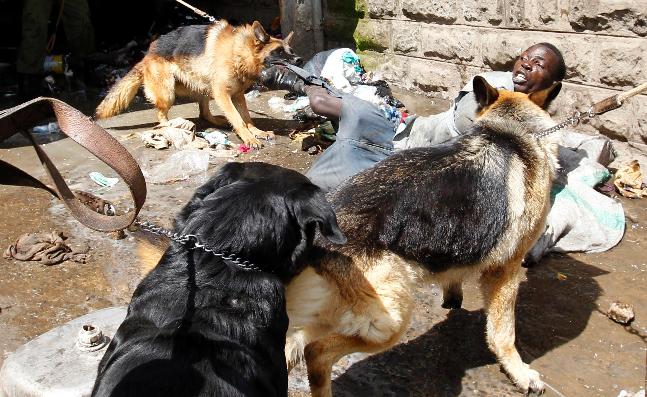
Tuesday, November 20, 2012
By Peter Opiyo

Police dogs attack a man found stealing from ethnic Somali homes during the second day of skirmishes in the Eastleigh neighbourhood of Kenya's capital Nairobi, November 19, 2012. Police fired tear gas to disperse Kenyans who threw stones and broke into the homes and shops of ethnic Somalis in Nairobi's Somali-dominated Eastleigh neighbourhood on Monday to protest against a bomb attack in the district on Sunday. REUTERS/Thomas Mukoya
On a normal day, women spread their wares, vehicles incessantly honk and hawkers shout for attention as people wade through the labyrinth that is Eastleigh.
Public Service Vehicles and private cars manoeuvre through inches of tarmac, most of them without regard to the law, resulting in perennial snarl-ups that clog this economic hub to near a standstill.
But amid this cacophony, Eastleigh’s inhabitants have somehow learnt to slither out of this maze to post it on the world map as a business hub. But this is now threatened by the frequent but erratic blasts that temporarily shock and awe its inhabitants and sadly claim lives.
The frequency of the blasts now seem to have drawn ire from locals and Sunday’s explosion along Juja road has been met with riots targeting the Somali community. Running battles made Juja road a no-go-zone for the better part of the day as businesses in Eastleigh remained shut and tension gripped the area.
Growing insecurity in the area has been attributed to Kenya’s war against militant Al Shabaab deep inside Somalia. When Kenya Defence Forces (KDF) ventured into the Horn of Africa country in October last year to decimate the terrorist group, Alshabaab warned of reprisal attacks in Nairobi and other cities.
At the time the late Internal Security Assistant Minister Orwa Ojode referred to Al Shabaab as a big animal with its head in Eastleigh and its tail in Somalia, and perhaps true to this statement, weeks after its tail had been neutered with the ultimate capture of Somalia’s Kismayu, Eastleigh remains defiant, with sporadic blasts killing and maiming dozens of innocent Kenyans.
Explosive device
Chairman of Eastleigh Business Association, Mr Hassan Gulleid says the business community is worried about insecurity.
“We are worried because we can’t open our businesses. We are asking the police to restore calm,” says Mr Gulleid.
Sunday’s attack that left seven people dead came barely a week after another blast in Eastleigh’s Biafra area injured one person. This happened barely two weeks after another explosion, which according to the police was an improvised explosive device, in the same residential area, that injured two people.
Otherwise known as a thriving business hub, Eastleigh now seems to be gradually turning into a terror haven, a scenario that sends jitters among investors. Other than the frequent explosions, there have been reported cases of gun running as well as incidents of illegal gun trade.
In September, police recovered a deadly cache of weapons in a residential house in the area and arrested two suspects. During the raid, six suicide bombs, 12 grenades, four AK 47 rifles and 480 bullets were recovered.
Economic boom
The impact of increasing insecurity is being felt. Area Chief, Mr Paul Ngugi said businesses have been paralysed. About 43,800 inhabitants live in the area.
“A lot of revenue is being lost. Businessmen from Rwanda, Burundi and other neighbouring countries are stranded now because they can’t make any transactions,” said Mr Ngugi.
In the past few years a diaspora-fuelled economic boom has transformed Eastleigh, predominantly occupied by Somalis, into a major business hub in East Africa. Huge malls, food stores, hotels, banks dot the area making it an enclave economy, detached from Nairobi’s Central Business District.
The National Cohesion and Integration Commission (NCIC) termed the inter-communal fighting a tragedy and urged communities to exercise restraint.
“It is a real tragedy to treat people with a collective guilt. We condemn this act and ask communities to act with restraint. ,” said NCIC Chairman Mzalendo Kibunjia, noting the commission would engage the communities involved to calm the situation once security has been restored.